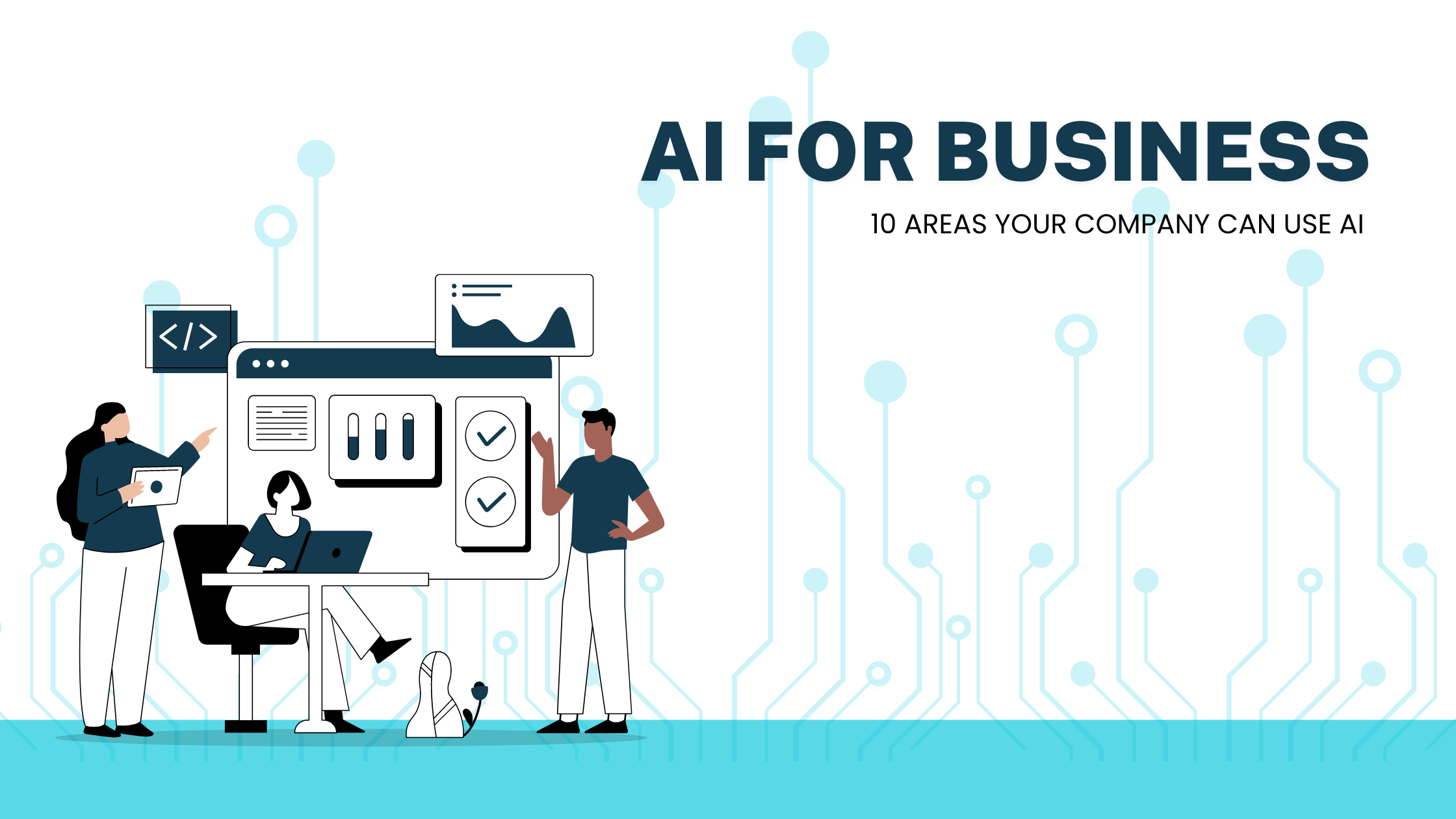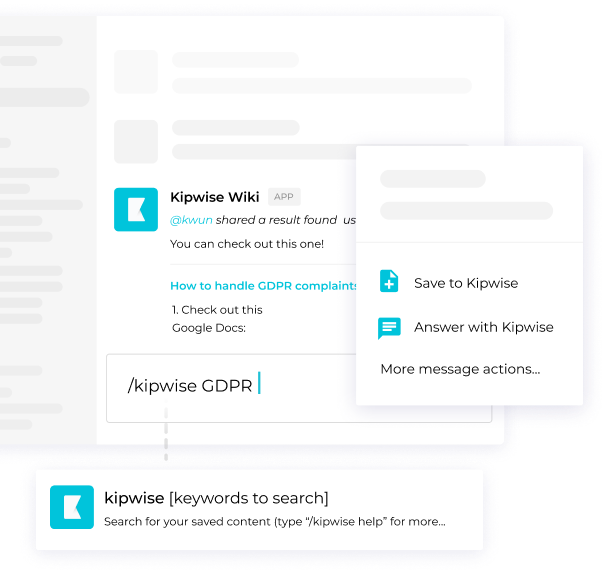In an era where technology is rapidly advancing, artificial intelligence (AI) has emerged as a powerful tool that can significantly enhance business operations. From automating routine tasks to providing deep insights through data analysis, AI has the potential to revolutionize various aspects of your organization.
In this blog post, we will explore 10 key areas where your business can leverage AI to boost efficiency, enhance customer experiences, and drive strategic growth. Whether you’re a small business or an established enterprise, these insights will help you harness the potential of AI to transform your organization.
1. AI to autonomy routine business processes
AI can handle repetitive tasks such as data entry, invoicing, and scheduling, freeing up employees to focus on more high level and strategic work. AI-powered chatbots can provide instant support, reducing the burden on human agents, while machine learning algorithms can analyze large datasets for insights to streamline decision-making. Additionally, AI can optimize supply chain management by predicting demand and automating inventory processes.
By automating these tasks, companies can improve efficiency, minimize errors, and allow employees to focus on more strategic initiatives, ultimately enhancing overall productivity.
2. AI as a creative force and content production
Companies can harness AI as a creative force in content production by leveraging advanced tools to generate ideas, draft articles, and even create visual content. AI algorithms can analyze trends and audience preferences to suggest relevant topics, while natural language processing tools can produce high-quality written material quickly.
Additionally, AI can assist in graphic design and video editing, enabling teams to streamline their creative processes. By integrating AI into their content strategies, companies can enhance creativity, increase efficiency, and produce engaging content that resonates with their target audience.
3. AI to improve customer support and customer experience
Companies can use AI to improve customer support and enhance overall customer experience by implementing AI-powered chatbots and virtual assistants that provide instant, 24/7 support for common inquiries. These tools can quickly resolve issues, freeing human agents to focus on more complex problems.
Additionally, AI can analyze customer interactions to identify trends and preferences, enabling personalized recommendations and proactive outreach. By leveraging AI for sentiment analysis, businesses can gain insights into customer feelings, allowing them to adjust their strategies accordingly. Ultimately, AI helps create a more responsive, efficient, and tailored customer service experience.
4. AI to access and organize company knowledge
Companies can use AI to access and organize company knowledge by implementing intelligent knowledge management systems that categorize and retrieve information efficiently. AI algorithms can analyze vast amounts of data, identifying patterns and relevant content to ensure employees can find the information they need quickly. Natural language processing enables users to search using conversational queries, making it easier to access documentation, best practices, and previous project insights.
By centralizing and organizing knowledge, AI fosters collaboration, reduces redundancy, and enhances decision-making across the organization, ultimately promoting a more informed and agile workforce.
Looking for a AI-powered company knowledge management software? Check out Kipwise! It’s integrated with ChatGPT, Slack, Chrome and more. With its AI knowledge suggestion function, you don’t even need to search and the KMS can suggest relevant information to assist your work directly in your workflow.
5. AI for data analysis and insights
Companies can leverage AI for data analysis and insights by utilizing machine learning algorithms that process large datasets quickly and accurately. These algorithms can identify trends, patterns, and anomalies that might go unnoticed in traditional analysis, enabling businesses to make informed decisions based on real-time data.
AI tools can also generate predictive analytics, helping companies forecast future outcomes and optimize strategies accordingly. By automating data processing and visualization, AI not only enhances efficiency but also empowers teams to focus on strategic initiatives, ultimately driving growth and innovation.
6. AI for cybersecurity
Companies can use AI for cybersecurity by implementing advanced systems that detect and respond to threats in real-time. AI algorithms can analyze network traffic patterns and identify anomalies that may indicate cyberattacks, such as unusual login attempts or data breaches. Additionally, machine learning models can continuously learn from new data, improving their ability to recognize emerging threats.
By automating threat detection and response, AI helps reduce the burden on security teams and enhances overall protection, enabling companies to safeguard sensitive information and maintain operational integrity in an increasingly complex digital landscape.
7. AI for sales and marketing
Companies can use AI to enhance sales and marketing efforts by leveraging data-driven insights to personalize customer interactions and optimize campaigns. AI algorithms can analyze consumer behavior and preferences, enabling businesses to segment their audience and deliver targeted messaging. Additionally, AI can automate lead scoring, identifying high-potential prospects and prioritizing outreach efforts. Chatbots can engage with customers in real time, answering questions and guiding them through the sales funnel. By utilizing AI for predictive analytics, companies can forecast trends and improve decision-making, ultimately driving higher conversion rates and boosting overall sales performance.
8. AI for human resources
Companies can use AI to enhance human resources by streamlining recruitment processes, improving employee engagement, and optimizing talent management. AI-powered tools can automate resume screening, identifying the best candidates based on specific criteria and reducing bias in hiring decisions. Additionally, AI can analyze employee feedback and performance data to gauge engagement levels, helping HR teams develop targeted retention strategies. Chatbots can assist with answering employee queries and providing information about company policies. By leveraging AI in HR, companies can create a more efficient, data-driven approach to managing their workforce and fostering a positive workplace culture.
9. AI for employee training
Companies can use AI to enhance employee training by creating personalized learning experiences tailored to individual needs and learning styles. AI-driven platforms can assess employees' skills and knowledge gaps, providing targeted training modules and resources that address specific areas for improvement. Additionally, AI can facilitate adaptive learning, adjusting content in real-time based on performance and engagement levels. Virtual simulations and interactive AI tools can offer hands-on practice in a safe environment, enabling employees to develop new skills efficiently. By leveraging AI in training, companies can foster continuous learning and development, ultimately leading to a more skilled and competent workforce.
10. AI for financial analysis and fraud detection
Businesses can use AI for financial analysis and fraud detection by employing machine learning algorithms to analyze transaction patterns and identify anomalies that may indicate fraudulent activity. AI systems can process vast amounts of financial data quickly, providing real-time insights and automating reporting tasks. By continuously learning from new data, these algorithms improve their accuracy in detecting irregularities, allowing organizations to respond swiftly to potential threats. Additionally, AI can enhance financial forecasting by analyzing market trends and historical data, enabling more informed decision-making and strategic planning. This proactive approach not only safeguards financial assets but also optimizes overall financial performance.
Related Readings:
- AI in Customer Service: 10 Ways to Implement It with Best Practices
- Best AI Chatbos of 2024 - Top 12 Picks




